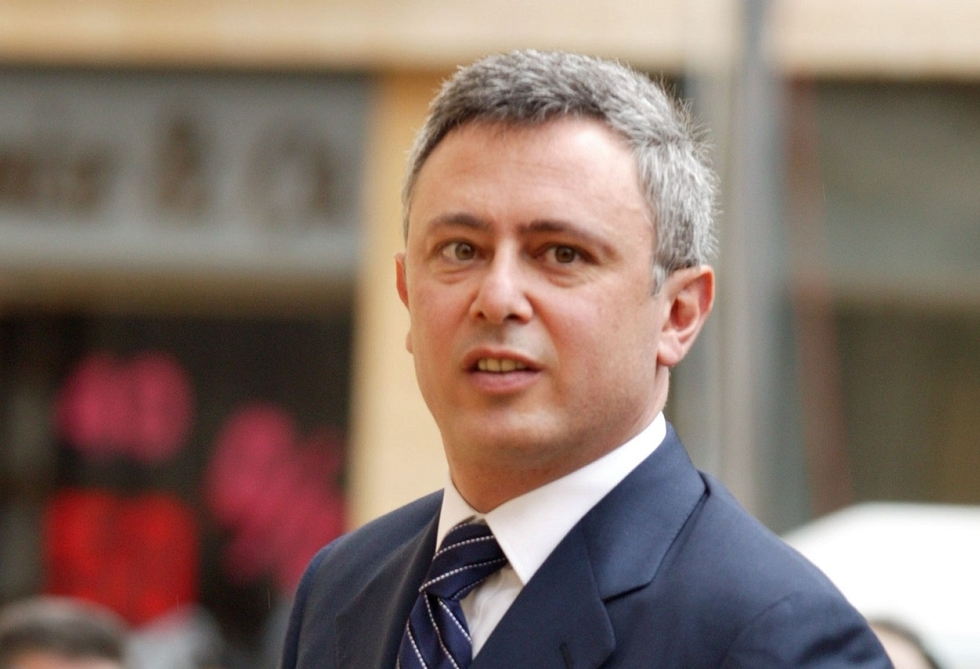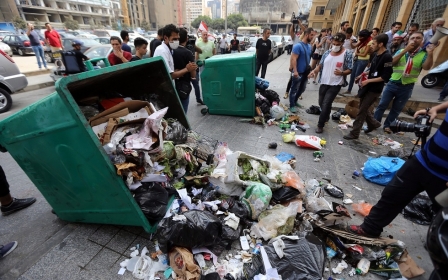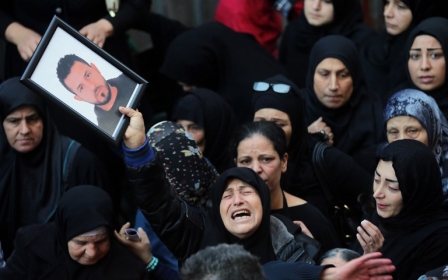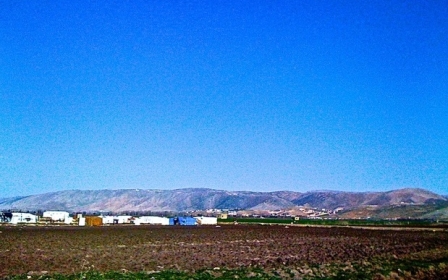ANALYSIS: Lebanon fails to elect president for the 32nd time. What hope now?

BEIRUT - For the 32nd time in a row, and despite renewed optimism, Lebanese politicians on Wednesday failed to elect a president.
Given that the last 18 months have brought only indecision, the outcome of the parliamentary session was perhaps not surprising.
Yet, since twin suicide bomb attacks by the Islamic State group on 12 November rocked Beirut, both Hezbollah chief Hassan Nasrallah and Future Movement leader Saad Hariri have emphasised the importance of national dialogue and called for an end to the presidential vacuum.
After the bombing, Lebanon saw a flurry of political activity with Hariri meeting French President Francois Hollande in Paris and the Parliamentary Speaker Nabih Berri holding national dialogue talks at his house. Then last week, Lebanese media suddenly reported that Hariri was preparing to back the presidential bid of Suleiman Frangieh.
At first glance, Frangieh appears like an odd choice for Hariri. Frangieh is the leader of the Christian, Hezbollah-affiliated Marada Movement and a former interior minister, but has family ties to Syrian President Bashar al-Assad and his father Hafez dating back to the 1950s.
Hariri has been highly critical of Assad’s conduct during Syria’s civil war, and views the Syrian government as responsible for the assassination of his father, Rafik, in central Beirut in 2005. The killing sent shockwaves through Lebanon and eventually led to the end of three decades of Syrian occupation.
But regardless of the old frictions, Lebanese media became awash with reports claiming the Frangieh deal would allow Hariri to become prime minister, a position he has held previously. Reports also said the deal had the backing of regional and international actors including Saudi Arabia, Iran, the United States and France, who have long been at odds about who should rule Lebanon.
“The countries of the region are tired and want to develop an exit strategy [from Syria and Yemen],” said Hilal Khashan, a political science professor at the American University in Beirut. “Agreeing on a Lebanese president is far less complex than the thorny issues in Syria and Yemen and reaching an agreement sets the stage for them towards ending these conflicts.”
As it turned out, the optimism was short lived. Analysts are now warning that even if Frangieh's nomination had gained international approval, it would have faced grave domestic hurdles and in particular struggled to secure support from within Hezbollah and the Future Movement's respective political allies.
Frangieh’s flaws
Imad Salamey, a political science professor at the Lebanese American University, said Frangieh’s election would have helped preserve Iranian influence in Lebanon and secure support for Hezbollah’s military establishment in the country in the face of March 14 calls for the group to disarm.
Hezbollah is part of the March 8 camp, firmly supports Assad and helped cause the collapse of Hariri’s last premiership in 2011. Conversely, if Hariri and the Future Movement secured the post of prime minister – which must be reserved for a Sunni – this would give more influence to Future’s Saudi backers.
Given Wednesday's vote, Frangieh's appointment could be seen as a compromise that didn't give enough to either side.
Frangieh’s Marada Movement is a minor player and only commands four seats in parliament, meaning that he could never hope to be a full counterweight to Hariri.
"(With Frangieh) you would end up with a president lacking real power," said Ramez Dagher, author of the Lebanese political blog Moulahazat.
"This means that he would not have enough power in parliament or on the ground (via protests) to challenge Hariri since Frangieh’s a local zaim (traditional feudal leader)".
In contrast, Freedom and Patriotic Movement (FPM) leader Michel Aoun, who has repeatedly been put forward for the presidency by the March 8 camp and controls more than 20 seats, is unlikely to be suitable for March 14. They are scared of his personal following and deem him unpredictable and unreliable.
The consensual appeal of Frangieh within Lebanon also appears shaky, making him less appealing to both sides.
Christian prestige
In Lebanon’s confessional power-sharing system the position of president is constitutionally prescribed to a Maronite Christian. Although rendered a largely ceremonial and symbolic role by the decrees of the Taif accord that ended the civil war, it remains the most prestigious Christian position in Lebanon.
Following the end of former army general Michel Suleiman’s term in May 2014, Hezbollah nominated Aoun as the March 8 block’s candidate for the presidency. The March 14 block nominated Samir Geagea, head of the Lebanese Forces.
Neither Aoun nor Geagea - both former civil war-era warlords and polarising figures - were likely to attain the requisite votes in parliament to gain office. Their nominations constituted a political face-off between the March 8 and March 14 blocks aimed at delaying the presidential election until a regional consensus on a nominee was agreed. The problem with this approach, however, is that the election of a Lebanese president has traditionally required a convergence of domestic and international interests.
"Selecting a president for Lebanon has proven to be a complex process, beyond voting for a candidate in a parliamentary session," said Salamey. "Consensus sectarian politics require extra-institutional political deliberation and negotiation requiring foreign consultation and sponsorship."
Dagher said both Aoun and Geagea would feel betrayed by the sudden focus on Frangieh as a potential consensus candidate.
Geagea, viewed as responsible for the murder of Frangieh’s father Toni, his wife, and three-year-old daughter during one of the most brutal intra-Christian massacres of Lebanon’s Civil War, was quoted in al-Akhbar newspaper on Thursday as stating that he would not approve Frangieh’s nomination "even if that leaves him alone without any allies".
The Christian Kataeb Party - the second major Christian party in the March 14 coalition alongside the Lebanese Forces - whose leader Amine Gemayel has previously been suggested as a potential presidential candidate, will also have serious reservations.
"Frangieh’s election - without the LF or FPM green light – would probably blow up both March 8 and March 14 blocs,” said Dagher.
“Presidential elections are the most important event for Lebanon’s Christian parties and the failure of any of Hezbollah and the Future Movement’s allies to stand with them could result in ending the alliances.”
The March 14 and March 8 political blocs came into existence during popular protests, known as the Cedar Revolution, which followed the assassination of Rafik Hariri in 2005. At that time the March 14 block united based on opposition to Syrian influence in Lebanon, while the March 8 bloc supported such influence.
Ides of March
Divisions both between and within the March 8 and March 14 blocs have increasingly emerged as a result of Syria’s civil war and Hezbollah’s military intervention in support of Assad.
“What united March 14 was its stance against Syria. If Hariri went with Frangieh then this would constitute a betrayal of this principle,” said Sami Nader, an economics and politics professor at Beirut’s St Joseph University.
“We are witnessing a deconstruction of a system that has divided Lebanese politics in two blocs. I think the Frangieh proposition will be dropped but regardless, the March 14 and 8 blocs are losing their cohesion.”
Perhaps most bizarre has been the emergence this year of a political rapprochement between Aoun and Geagea, who have been traditional enemies but are now acting as evidence that a new dynamic is emerging in Lebanese politics.
Nor have objections to Frangieh’s election been restricted to the Christian community, with wider fissures also appearing in the Future Movement.
Speaking last week Ashraf Rifi, the justice minister and a Future Movement member from the majority Sunni city of Tripoli, notably stated that “any person with links to [Bashar] al-Assad is not a good model to take over the presidency”.
Scores of Sunni residents in Tripoli have travelled to Syria since the start of that country’s civil war, fighting against Assad with various opposition groups including IS, Jabhat al-Nusra and the Free Syrian Army.
Nader said that a Frangieh presidency could lead to further radicalisation in Sunni parts of Lebanon.
“Sunnis from all over the region are fighting against Iranian influence, particularly in Syria. Bringing in someone close to Assad would have a reaction. In addition to objections from rival political parties we would see more Sunnis in Lebanon getting radicalised.”
New MEE newsletter: Jerusalem Dispatch
Sign up to get the latest insights and analysis on Israel-Palestine, alongside Turkey Unpacked and other MEE newsletters
Middle East Eye delivers independent and unrivalled coverage and analysis of the Middle East, North Africa and beyond. To learn more about republishing this content and the associated fees, please fill out this form. More about MEE can be found here.




